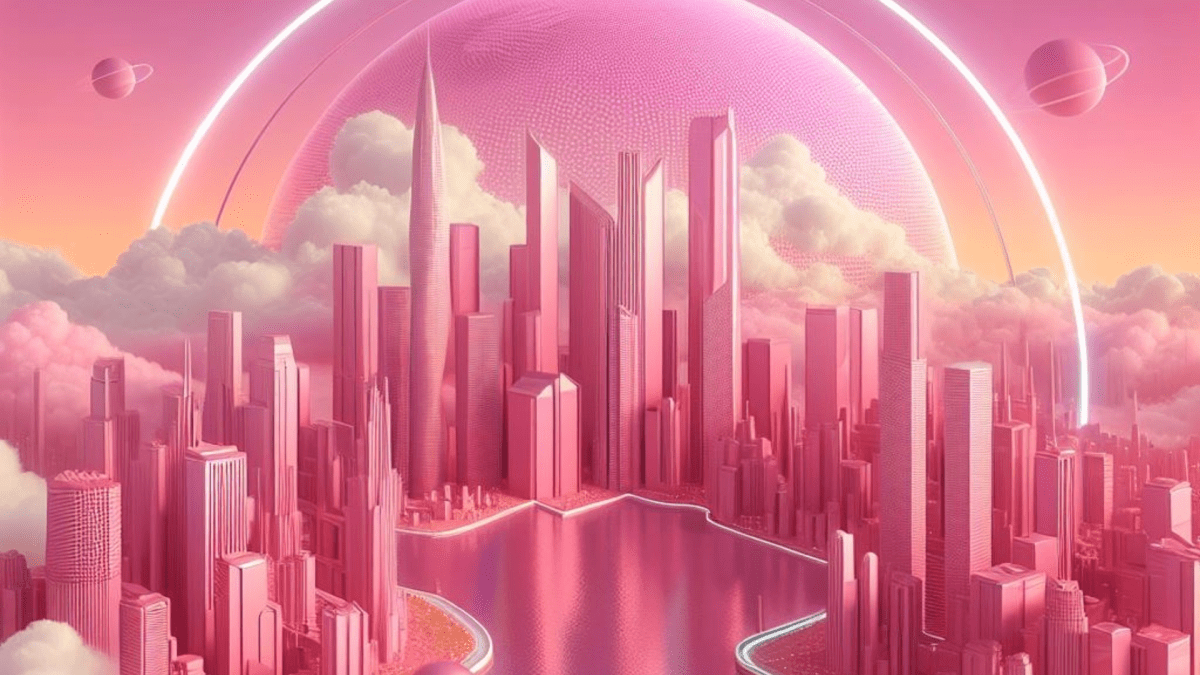Welcome to Gag City, the pink metropolis inhabited by stans and brands alike.
In the days leading up to the release of “Pink Friday 2,” Nicki Minaj’s fifth studio album and sequel to her debut record “Pink Friday” that dropped on Friday, Twitter was flooded with AI-generated images of pink-toned cityscapes. Gag City, the dreamy false utopia ruled by Minaj and her Barbz, broke through stan Twitter and became a viral meme that brand accounts immediately used for their own marketing — promoting Minaj’s album for free.
Is it an authentic stan-led campaign to build hype for Minaj? Is it a plant to game engagement for both the album and brands? What’s clear is that the viral moment is a win for Minaj, manufactured or not.
It started in September, when Minaj teased the album’s cover art online. The image features Minaj on a pink subway car, drifting through pink clouds with a futuristic (and obviously, pink) city skyline in the background.
She and her Barbz started referring to the album’s release as “Gag City,” NBC News reports, referencing gay slang for being so amazed that you’re at a loss for words. One might be gagged by witnessing a stunning outfit change, or by listening to a perfect record, like “Pink Friday 2.” Leading up to the release, stans started posted AI-generated images of a pink concrete jungle, joking that fictional characters and celebrities were arriving to Gag City in anticipation of Minaj’s album. In one of the first, posted on Dec. 1 according to Know Your Meme, a fan account shared an image of a pink plane labeled “Gagg City” flying over a similarly pink skyline.
In the days before the release, Minaj told fans to “prepare for landing” and teased a description of her pink utopia. Barbz replied with AI-generated renditions of the descent into Gag City.
X (formerly Twitter) users began crafting elaborate narratives about Gag City’s inhabitants and government. One posted an image of Barbz storming the Pink House, which another user described as the fandom’s own January 6th. Another posted an image of pink-clad citizens protesting in the streets of Gag City, calling for Minaj to release the album’s track list. Though some may believe that Gag City is a utopia, one account posted an image of a matronly Minaj handing out CDs of her album to impoverished children “on the outskirts of Gag City,” implying that the pink society also has a class divide problem.
Gag City is also riddled with stan wars, as fans of rival pop stars posted images of their faves vying for Minaj’s seat at the head of her city’s government. In a nod to Greek mythology, one account posted an image of a Trojan horse decorated in Beyoncé’s “Renaissance” disco motif.
Never one to miss out on an easy trend, brand accounts started joining in on the Gag City hype. Chili’s posted an image of rosy smoke billowing from its restaurant, which makes me wonder if air pollution exists in Gag City. Wheat Thins, Baskin-Robbins, Dunkin’ Donuts, Pizza Hut, Red Lobster, Oreo, Bing (??), the Empire State Building and countless others posted their versions of Gag City.
On one hand, memes tend to die the minute brand accounts start co-opting them — nothing is more tiresome than seeing a fun joke turn into a corporate-friendly marketing ploy. AI-generated images are already ethically fraught, and critics have raised concerns over AI generators trained on artwork without the consent of the work’s artists. Artists have also criticized brands for using AI-generated art instead of commissioning work from a real, human artist. Though using AI-generated art for commercial use is legal, as copyright laws pertaining to AI are virtually non-existent, it’s generally seen as a shitty move by many in the art world.
On the other, it’s free promotion for Minaj, and as a lifelong Barb who spent her adolescence running a stan account for “Pink Friday,” I consider it a win.
Nicki Minaj is an artist who’s been embroiled in controversy throughout her career, from posting bad takes about Covid vaccines to defending her husband Kenneth Petty, a convicted sex offender. She may be a brilliant artist, but her problematic history makes her far from the family-friendly public figure that brands are more likely to endorse.
But with Gag City, Minaj has brands doing all of her marketing for her. “Pink Friday 2” is an artistic marvel in itself (though I am probably biased), but the free promotion that it’s been getting as a viral meme is particularly astounding. Artists have spent the last few years trying to drum up engagement for their work by making their songs trend on TikTok, which audiences have started to resist. Gag City doesn’t bank on being the viral song of the summer to drive streaming numbers — the bit is removed enough for non-stans to enjoy it, while still revolving around the album it’s promoting.
Brand Twitter tends to turn fun trends into advertising opportunities, taking organic community interactions and spitting out contrived versions clearly made to go viral. It may be grating, but in this case, it’s working in Minaj’s favor. This week, everyone wants to go to Gag City.

